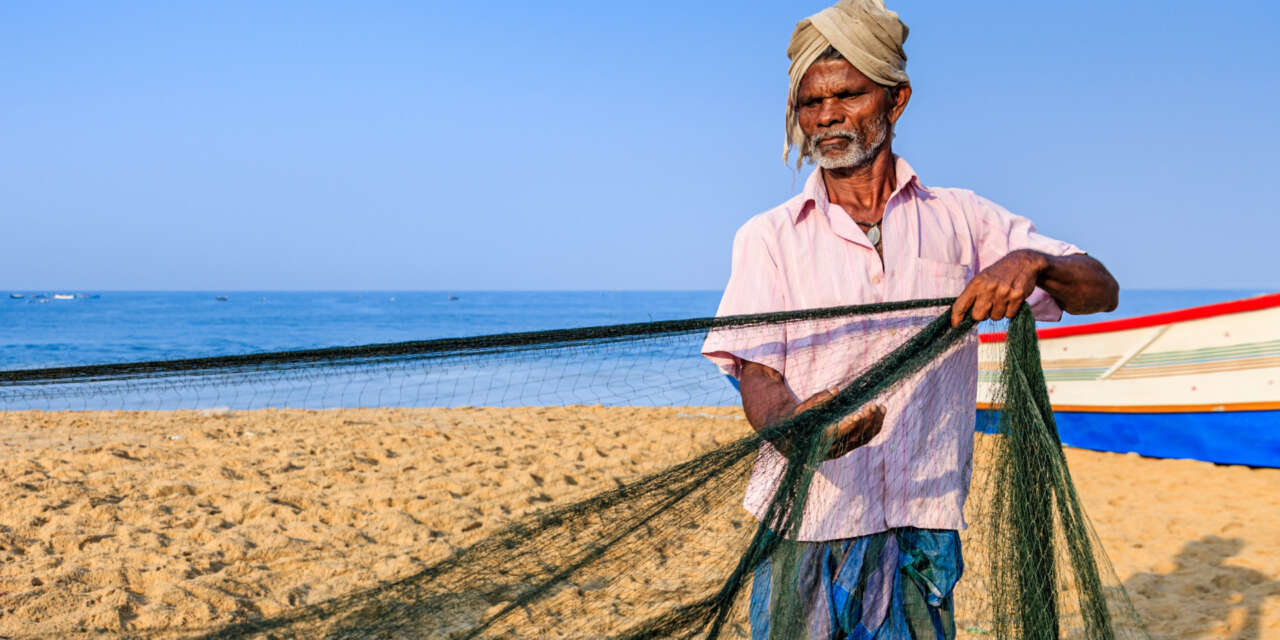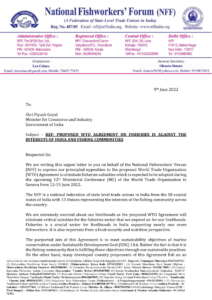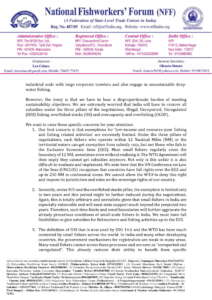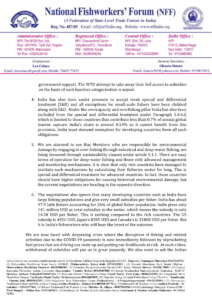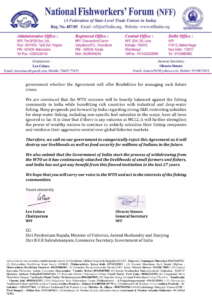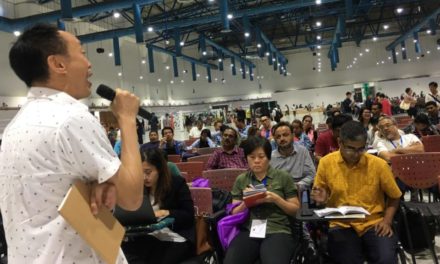Shri Piyush Goyal
Minister for Commerce and Industry
Government of India
REF: PROPOSED WTO AGREEMENT ON FISHERIES IS AGAINST THE INTERESTS OF INDIA AND FISHING COMMUNITIES
Dear Minister Goyal,
We are writing this urgent letter to you on behalf of the National Fishworkers’ Forum (NFF) to express our principled opposition to the proposed World Trade Organisation (WTO) Agreement to eliminate fisheries subsidies which is expected to be adopted during the upcoming 12th WTO Ministerial Conference (MC) in Geneva from 12-15 June 2022.
The NFF is a national federation of state level trade unions in India from the 10 coastal states of India with 13 Unions representing the interests of the fishing community across the country.
We are extremely worried about our livelihoods as the proposed WTO Agreement will eliminate critical subsides for the fisheries sector that we depend on for our livelihoods. Fisheries is a crucial sector for livelihoods in India supporting nearly one crore fishworkers. It is also important from a food-security and nutrition perspective.
The purported aim of this Agreement is to meet sustainability objectives of marine conservation under Sustainable Development Goal (SDG) 14.6. Rather the fact is that it is the fishing community that is fulfilling these objectives through our sustainable practices. On the other hand, many developed country proponents of this Agreement fish on an industrial scale with large corporate trawlers and also engage in unsustainable deep-water fishing.
However, the irony is that we have to bear a disproportionate burden of meeting sustainability objectives. We are extremely worried that India will have to remove all subsidies under the three pillars of the negotiations; Illegal, Unreported, Unregulated (IUU) fishing, overfished stocks (OS) and overcapacity and overfishing (OCOF).
We want to raise these specific concerns for your attention.
- Our first concern is that exemptions for ‘low-income and resource-poor fishing and fishing related activities’ are extremely limited. Under the three pillars of negotiations, such fishers who operate within 12 Nautical Miles (NM) or the territorial waters can get exemption from subsidy cuts, but not those who fish in the Exclusive Economic Zone (EEZ). Most small fishers regularly cross the boundary of 12 NM, sometimes even without realising it. The WTO Agreement will then imply they cannot get subsidies anymore. Not only is this unfair it is also difficult to evaluate and implement. We note here that the UN Conference on Law of the Seas (UNCLOS) recognizes that countries have full rights over the EEZ and up to 250 NM in continental zones. We cannot allow the WTO to deny this right and impose its jurisdiction and rules on the sovereign rights of our country.
- Secondly, under IUU and the overfished stocks pillar, the exemption is limited only to two years and this period might be further reduced during the negotiations. Again, this is totally arbitrary and unrealistic given that small-fishers in India are especially vulnerable and will need state support much beyond the projected two years. Therefore, such time limits and zonal boundaries will further aggravate the already precarious conditions of small-scale fishers in India. We must have full flexibilities to give subsidies for fishworkers and fishing activities up to the EEZ.
- The definition of IUU that is now used by SDG 14.6 and the WTO has been much contested by small fishers across the world. In India and many other developing countries, the government mechanisms for registration are weak in many areas. Many small fishers cannot access these processes and are seen as “unreported and unregulated”. This already reduces their ability to benefit from specific government support. The WTO attempt to take away their full access to subsidies on the basis of such baseless categorisation is unjust.
- India has also been under pressure to accept weak special and differential treatment (S&D) and all exemptions for small-scale fishers have been clubbed along with S&D. Under the overcapacity and overfishing pillar India has also been excluded from the special and differential treatment under Paragraph 5.4.b.i) which is limited to those countries that contribute less than 0.7% of annual global marine capture. India’s share is around 4.53% so it cannot benefit from this provision. India must demand exemption for developing countries from all such obligations.
- We are alarmed to see that Members who are responsible for environmental damage by engaging in over-fishing through industrial and deep-water fishing, are being favoured through sustainability clauses under article 5.1.1. There are easy terms of operation for deep-water fishing and those with advanced management and monitoring mechanisms. It is clear that only rich countries have managed to institute such mechanisms by subsidising their fisheries sector for long. This is special and differential treatment for advanced countries. In fact, these countries should have higher obligations for causing historical environmental damage, but the current negotiations are heading in the opposite direction.
- The negotiations also ignore that many developing countries such as India have large fishing populations and give very small subsidies per fisher. India has about 97.9 lakh fishers accounting for 26% of global fisher population. India gives only 141 million USD as total subsidies to the sector, which means the subsidy is only 14.50 USD per fisher. This is nothing compared to the rich countries. The US subsidy is 4956 USD, Japan’s 8385 USD and Canada’s is 31800 USD per fisher. But it is India’s fishworkers who will bear the brunt of the outcome.
We are now faced with deepening crisis where the disruption of fishing and related activities due to the COVID-19 pandemic is now immediately followed by skyrocketing fuel prices that are driving our costs up and putting our livelihoods at risk. At such a time, withdrawal of subsidies will put us in great jeopardy. We also want to ask the Indian government whether the Agreement will offer flexibilities for managing such future crises.
We are convinced that the WTO outcome will be heavily balanced against the fishing community in India while benefitting rich countries with industrial and deep-water fishing. Many proposals put forward by India regarding strong S&D, restricting subsidies for deep-water fishing, including non-specific fuel subsidies in the scope, have all been ignored so far. It is clear that if there is any outcome at MC12, it will further strengthen the power of wealthy nations to continue to unfairly subsidise their fishing companies and reinforce their aggressive control over global fisheries markets.
Therefore, we call on our government to categorically reject this Agreement as it will destroy our livelihoods as well as food security for millions of Indians in the future.
We also submit that the Government of India start the process of withdrawing from the WTO as it has continuously attacked the livelihoods of small farmers and fishers, and India has not got any benefit from this flawed institution in the last 27 years.
We hope that you will carry our voice to the WTO and act in the interests of the fishing communities.
Signed by
Leo Colaco, Chairperson, NFF
Olencio Simoes, General Secretary, NFF
CC:
Shri Parshottam Rupala, Minister of Fisheries, Animal Husbandry and Dairying
Shri B.V.R Subrahmanyam, Commerce Secretary, Government of India

